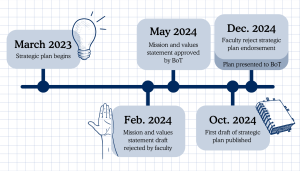
The faculty rejected its endorsement of the college’s current strategic plan, a proposed vision for the college’s future, during Tuesday’s faculty meeting.
The motion for the faculty to endorse the priorities and goals of the strategic plan failed in a 66-73 vote with 12 abstentions, according to Clerk of the Faculty Joshua Smith.
“Something of this magnitude being rejected, took to my history, is not common,” said Smith, who joined the college in 2007, right before the approval of the most recent college-wide strategic plan.
The faculty is the only group on campus to reject endorsement of the strategic plan, which has been in progress for more than 18 months and involved the collaboration of dozens of campus community members, thus far. According to college President Nicole Hurd, the plan was endorsed by college staff 244-3, by the Alumni Association Board and unanimously by Student Government. None of these endorsements are considered formal approval of the plan but have weighty symbolic power and can influence decision-making.
Smith said that the proposed motion for the endorsement was followed by a “very lengthy discussion.”
According to Smith, nine tenured faculty members and two untenured faculty members — on behalf of nine other untenured faculty — spoke against the motion. He said that the major concerns of those who spoke were a lack of clear vision for academic excellence and faculty support in the plan, and a lack of inclusion in the planning process.
Women, Gender & Sexuality Studies Professor Mary Armstrong said that she did not support the strategic plan.
She said that the majority of critical comments on the plan were “because it does not center academic excellence or reaffirm our long-standing commitment to being a leading liberal arts college nationally.”
“No plan is perfect,” Armstrong said. “Almost every single faculty member, for or against, agrees no plan is perfect, but the plan has to be responsible to the college and ultimately to the education we provide for students.”
“I have deep respect for the colleagues who worked on this, but I just didn’t think it was right,” said Robin Rinehart, a religious studies professor who spoke against the motion.
Ten faculty members and Provost Laura McGrane spoke in favor of the motion, according to Smith. He said that the main supportive comments focused on the plan supporting collaborative teaching and experiential learning, infrastructure improvements and the recruitment and retention of faculty.
Professor of Religious Studies Brett Hendrickson, the co-chair of the “Working at Lafayette” working group, described the strategic planning process as inclusive, citing different on and off-campus groups included and solicited for feedback.
“I’m not sure that I fully understand the positions that people were taking, especially about inclusivity,” he said of those who opposed the endorsement of the strategic plan.
Hendrickson spoke at the meeting, saying that the plan has “a lot of infrastructure improvements baked in that will help the academic mission” and “some exciting new projects.”
He said that while he was optimistic about faculty endorsement of the plan, “the fact that it wasn’t is not completely surprising.”
“I continue to feel that it’s a positive plan,” Hendrickson said. “I don’t feel that a close vote at the faculty meeting is indicative that the plan is broken or doomed.”
Several professors declined to comment on the meeting or their thoughts on the strategic plan.
“We respect the prerogative of the faculty to vote on the motion of the Advocacy and Coordination Council that faculty vote on the strategic plan, as we have embraced the principles of inclusivity and iteration throughout the strategic planning process,” Hurd wrote in an email.
According to Rinehart, Hurd did not speak in favor of the strategic plan at Tuesday’s meeting.
The strategic plan will be discussed during the Board of Trustees meeting this weekend. It is unknown whether the board, the only group with the power to formally approve the plan, will be put to a vote on it.
The motion was put forth by the Advocacy and Coordination Council, of which Smith is the chair. The council was charged by a prior motion passed during a November faculty meeting authored by Armstrong, Rinehart and Religious Studies Professor Robert Blunt. The previous motion was created in response to the announcement of a campus community survey in lieu of formal and separate faculty endorsement of the strategic plan.
The strategic plan, “Becoming Lafayette: A Vision for Our Third Century,” was first announced in 2022. With the initial draft of the strategic plan finalized and expected to be presented to the Board of Trustees soon, the college is nearing the conclusion of the plan’s third of four phases.
Elisabeth Seidel ’26 contributed reporting.














































